- Why is my axolotl not eating?
- 1 – A new habitat ( New Tank Syndrome )
- 2 – The arrival of winter (Pre-hibernation state)
- 3 – The water that is too hot (Overheating)
- 4 – Poor Water Conditions
- 5 – Your axolotl doesn’t like his food (problems with food)
- 6 – An aggressive tankmates
- 7- An intestinal occlusion due to constipation
- 8- A Crashed Nitrogen Cycle!
- 9- Your Axolotl has swallowed something he shouldn’t (Impaction)
- 10- A Powerful and noisy filter
- 11- Your Axolotl is not hungry (Over-feeding)
- 12- Your axolotl refuses to eat because of harmful bacteria or parasites (Intestinal parasites):
- 13- A stressed axolotl will not eat
- 14-Bloated Axolotl will stop feeding :
- 15- A sick or injured axolotl will reject its food
- 16- Your axolotl wants live food instead of pellets
- 17- Axolotls may ignore their food because of water or eggs retention
- Final Thoughts
- Frequently Asked Questions
- Some useful Resources
Why is my axolotl not eating?
When an axolotl is not eating, impaction, Blockage, and poor housing are often the main reasons. Stress, severe illness, bad water conditions and temperature, or an aggressive tank mate can also cause your axolotl to refuse or spit out its food.
- Why is my axolotl not eating?
- 1 – A new habitat ( New Tank Syndrome )
- 2 – The arrival of winter (Pre-hibernation state)
- 3 – The water that is too hot (Overheating)
- 4 – Poor Water Conditions
- 5 – Your axolotl doesn’t like his food (problems with food)
- 6 – An aggressive tankmates
- 7- An intestinal occlusion due to constipation
- 8- A Crashed Nitrogen Cycle!
- 9- Your Axolotl has swallowed something he shouldn’t (Impaction)
- 10- A Powerful and noisy filter
- 11- Your Axolotl is not hungry (Over-feeding)
- 12- Your axolotl refuses to eat because of harmful bacteria or parasites (Intestinal parasites):
- 13- A stressed axolotl will not eat
- 14-Bloated Axolotl will stop feeding :
- 15- A sick or injured axolotl will reject its food
- 16- Your axolotl wants live food instead of pellets
- 17- Axolotls may ignore their food because of water or eggs retention
- Final Thoughts
- Frequently Asked Questions
- Some useful Resources
Disclosure
You should always ask a veterinarian if you think that your axolotl is sick, I will give some advice here but the last word would be that of your veterinarian because lack of food or malnutrition can lead to your axolotl’s unexpected death.
You’re wondering now and asking why my axolotl is not eating. but you should also know that an adult axolotl may not eat for two weeks if its last meal was richer than usual.
The probable following reasons for your axolotl’s fasting are in case your axolotl has suddenly ceased to eat or is not eating as usual either in terms of quantity of food or in time between meals!
Let’s dive in …
1 – A new habitat ( New Tank Syndrome )
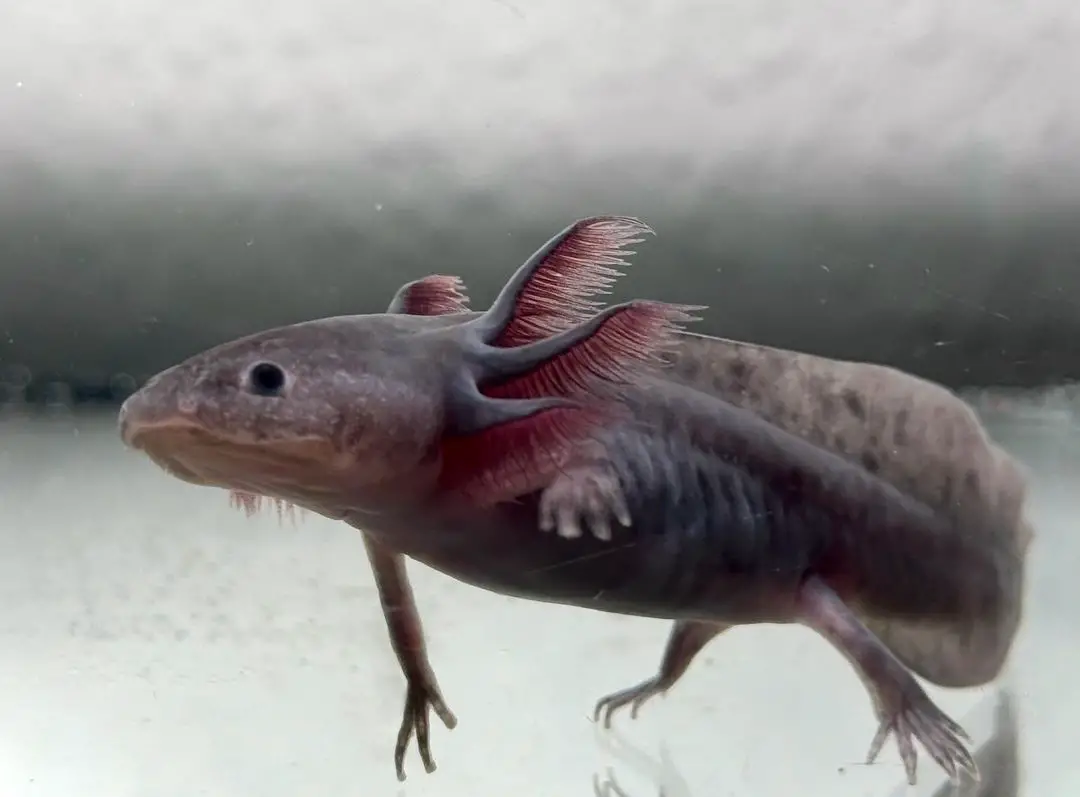
Moving stress is the N° One reason of the reasons why your axolotl won’t eat. Some axolotls refuse to feed, sometimes throughout the first week when you move them into a new tank, or even if you change the decoration of their aquarium.
If you have just bought your axolotl and got it correctly introduced in its new tank, just give it a little time to get used to its new environment, to its new tank companion, come back to see the breeder you bought your axolotl from, and ask him for advice and ask if he has not noticed that this axolotl has stopped eating long before he sells it to you, in this case, it would be one of the other reasons that will follow.
2 – The arrival of winter (Pre-hibernation state)
Because of seasonal changes, your axolotl will now just lengthen the time between one meal and another, it could be that during the winter (the cold seasons), when temperatures drop and you have not heated the room or exposed your axolotl’s tank, which could be understandable, then the metabolism of your axolotl will slow down and the number of meals per week will also decrease.
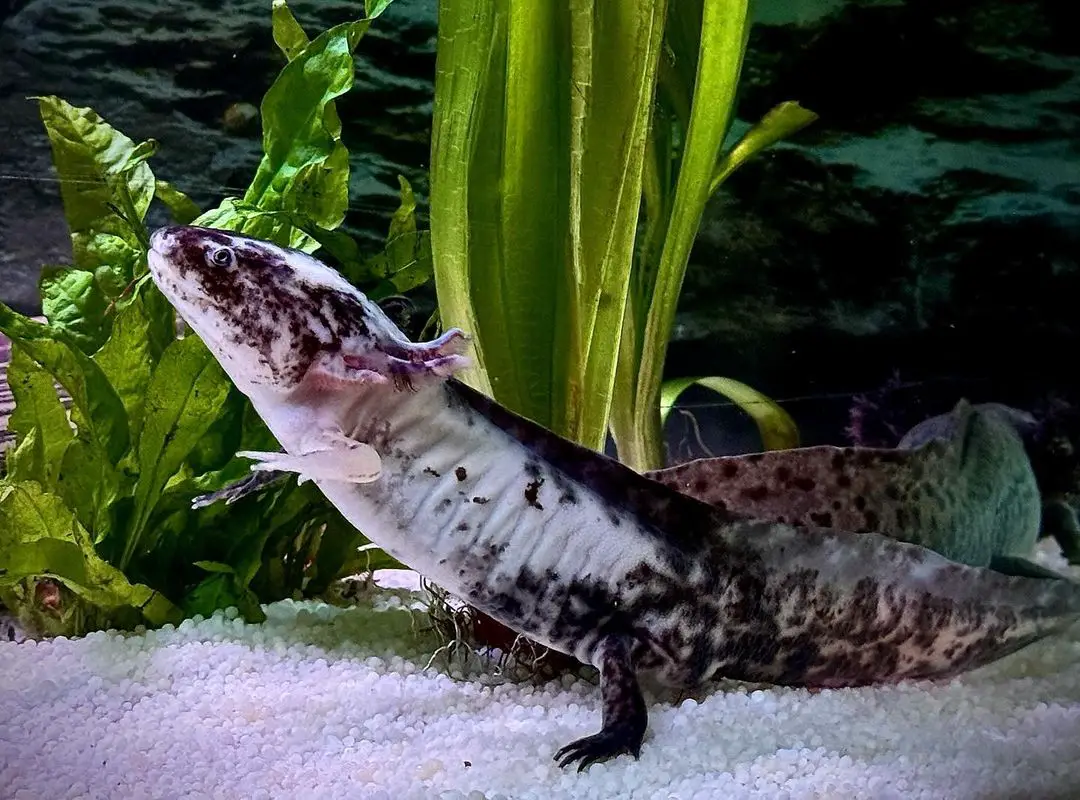
When the temperature of the water in the tank drops below 15° for several days, sometimes just for a few hours, especially for a young axolotl, he may think that winter is coming, food will become scarce and will start to prepare itself to enter into hibernation.
If the temperature drops rapidly for a short period of time, some axolotls will even spit out their food, quickly empty their digestive system (you will also notice more poop in the tank), and will quickly slow down their metabolism and lose interest in food.
In this case, you should gradually bring the water temperature back to its normal level (16°C/18°) between 60°F and 65°F.
You can use a heater if necessary ( just for a short period ! ) and also consider installing a thermometer to constantly monitor the water temperature.
3 – The water that is too hot (Overheating)
Contrary to the previous reason, if the water temperature of your axolotl rises and remains for several days above 22°C, your axolotl usually acting normally ( normal activity ) will surely stress and may have a hard time eating and refuse to feed; therefore check the water temperature and make sure it remains between 16°C and 18°C, it should not exceed 23°/24°C, especially for a long time!
It would help if you quickly cooled down your tank because warm water will quickly become depleted of oxygen and your axolotl will have to come up to the surface quickly to breathe, this state of stress will put it in “survival” mode and it will not be interested in food.
4 – Poor Water Conditions
Like in case of water temperature fluctuations, your Axolotl may also be refusing to eat because of the quality of his water, which may have deteriorated. Your filter may be too dirty or it may not work without your attention, which could cause water quality to deteriorate, too high level of Ammonia (ammonia issues) will make the water unbearable for your axolotl.
The ideal levels are :
- Ammonia should be at 0 ppm
- Nitrite should be maintained below 0.75 ppm
- Acceptable Nitrates Level: from 20 to 60 ppm are acceptable.
Also check if the Nitrogen Cycle is not interrupted, in this case, you will have to quickly replace at least 25% of the tank water and try to stabilize the water conditions.
5 – Your axolotl doesn’t like his food (problems with food)
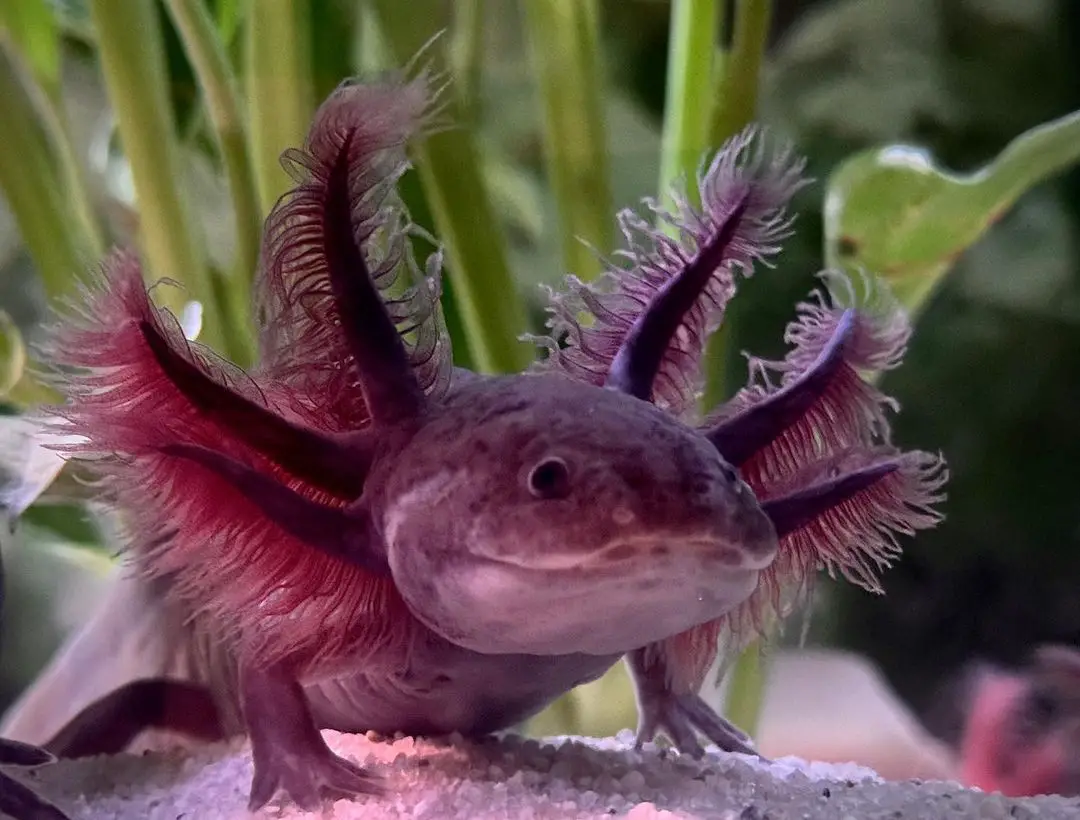
Your axolotl doesn’t want to eat anymore because of the bad quality of the food you give it. badly preserved worms or spoiled pellets.
If you have recently switched your axolotl’s food, you may have started feeding slightly larger than usual pellets or pieces of meat or bigger worms than usual, that your axolotl cannot swallow anymore. The pellets should quickly become soft once in contact with water.
Think also to buy fresh and good quality worms, some worms tend to have a bitter taste due surely to the bad conditions of their intensive production.
The sinking pellets may also have become too hard or just got bad taste due to contact with dry air, making them difficult to digest, your axolotl may have suffered from severe constipation after the last meal and no longer want them!
See my other article on how to correctly feed your axolotl for more info on this topic. Also think to better preserve your axolotl’s food and buy only the quantity that your axolotl will be able to consume in 15 days.
6 – An aggressive tankmates
If you’ve noticed your axolotl isn’t chowing down like usual, it could be because it’s getting bullied by another tank mate. Take a peek to see if there are any signs of injury, which might mean it’s been getting roughed up by its buddy.
Your axolotl might be hanging back in its hideout to dodge any trouble, which can put a damper on its appetite.
To keep your axolotls well-fed and happy, try feeding them separately. If things are getting too heated, you might want to think about giving them their own space. Axolotls can be pretty territorial, especially when it comes to food and hiding spots. Giving each of them their own turf can help avoid any dinner table drama.
7- An intestinal occlusion due to constipation
Your axolotl may not eat because of constipation, which can occur especially in young axolotls, when they are not yet used to pellets and have not yet developed adequate intestinal flora.
An axolotl may also suffer from constipation when it eats something it can’t digest or easily pass through its digestive system.
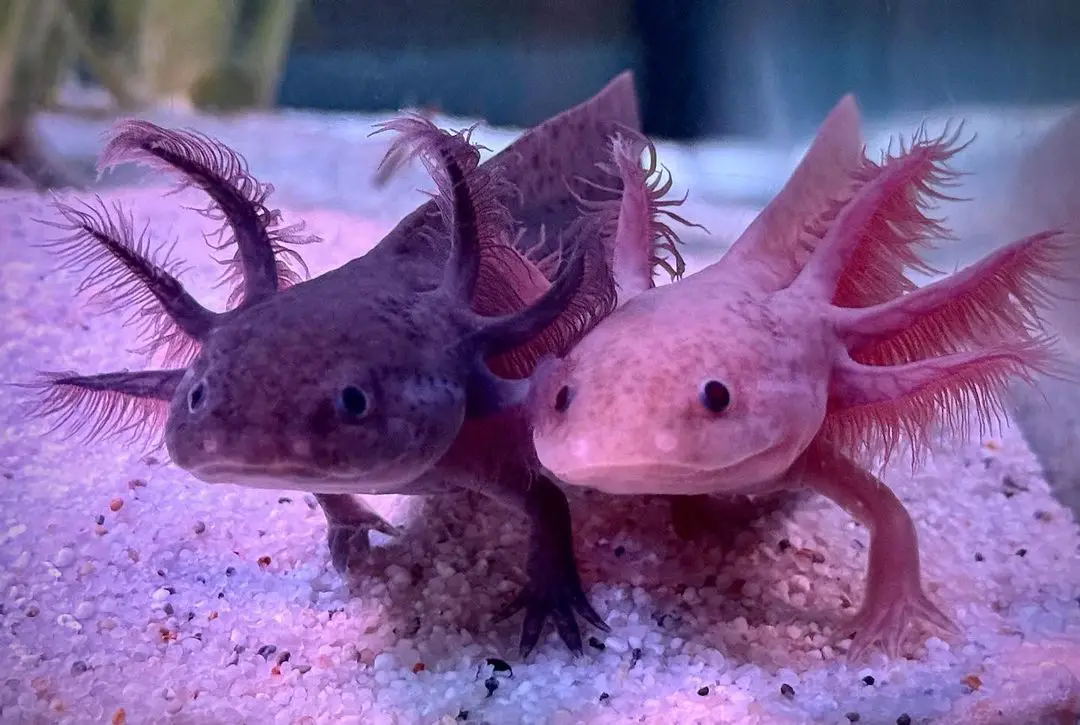
The cause may be poor digestion of fish bones, the shell of a crustacean, or just the head of a mealworm, or even bad digestion of pellets that are of poor quality or that have become too tough and don’t become soft on contact with the water.
As in the case of Impaction, Tubbing your axolotl (putting your axolotl in a tub filled with dechlorinated water and putting it in your fridge while gradually and carefully reducing the temperature) may be the solution by exposing them to a low temperature, this will put them in a state of pre-hibernation, which will force your axolotl to regurgitate its food and empty and unblock its digestive tract.
Overfeeding can also be the cause of constipation and the reason why your axolotl is not eating anymore, so avoid giving your axolotl more than it can completely eat in less than 3 minutes.
When your axolotl is overfed, you will also notice the following symptoms :
- Floating
- Pooping more than usual
- Bloating
A visit to the vet will solve this problem with a treatment based on kerosene oil. Unlike impaction, your axolotl will not require surgery to fix the problem and get your axolotl to eat again.
8- A Crashed Nitrogen Cycle!
You may have been in too much of a hurry to bring your axolotls back when your aquarium has not yet completed its nitrogen cycle!
The water may be saturated with nitrates and the axolotl can’t eat anymore and it could also be that he vomits his food when he forces himself to swallow some.
Test the water in the tank and make sure it has completed its nitrogen cycle.
9- Your Axolotl has swallowed something he shouldn’t (Impaction)
He won’t eat If your Axolotl swallowed something while eating, like gravel that got stuck in her intestine, there is not much to do, some recommend putting it in the refrigerator, as he may vomit and reject it! others say it is good to give him (make him drink) a little beaver oil!
Personally, I just advise you to lower the water temperature to just over 14 °C to slow down the bacterial activity in his intestine and avoid the production of Gas that would make your axolotl float and stress him even more !!
If this has already happened, reduce the water level so that your axolotl can rest on at least one of the decors.
10- A Powerful and noisy filter
Your axolotl refuses to eat because the water is too turbulent and causes stress. The tank of your axolotl needs a powerful filter, but you may be using the wrong model, it may create a strong current in the water and it is not ideal for an axolotl that hates swirling and loves calm water.
Get a better water filtering system, a silent and powerful filter at the same time that will be helped by some tankmates that will eat the food waste and probable parasites and living plants to oxygenate and make the water more pleasant.
11- Your Axolotl is not hungry (Over-feeding)
If your axolotl refuses to eat even though its water is good, its food is what it likes and it doesn’t suffer from any disease, the cause may be because you are giving it much more food than it can eat!
One nightcrawler a day, sometimes even every other day is usually enough for an average-sized axolotl.
Avoid throwing too much food into the tank, and monitor your axolotl to understand how often it is feeding so you can adjust the amount of food you give it.
Let him fast for one or two days and give him an earthworm or a nightcrawler and if he still refuses to eat take him to the vet or check his tank to find out why he refuses to eat, beware of the risk of anorexia.
Be aware that a middle-aged axolotl may eat only once every three days, or even more for the older ones.
12- Your axolotl refuses to eat because of harmful bacteria or parasites (Intestinal parasites):
An axolotl suffering from Septicemia (because of Aeromonas and pseudomonas), will for example lose its appetite. There is also the parasite Opalina, Camallanus Worms
If you feed your axolotl with live food (or unsterilized plants), and if it has contracted internal Hexamita, it will have a hard time keeping a balanced weight and you will see it become skinny and this could make you believe that it is not eating enough.
Only a vet’s test can confirm if your axolotl has parasites that have caused it to lose its appetite, so take a sample of its stools and go see the vet.
13- A stressed axolotl will not eat
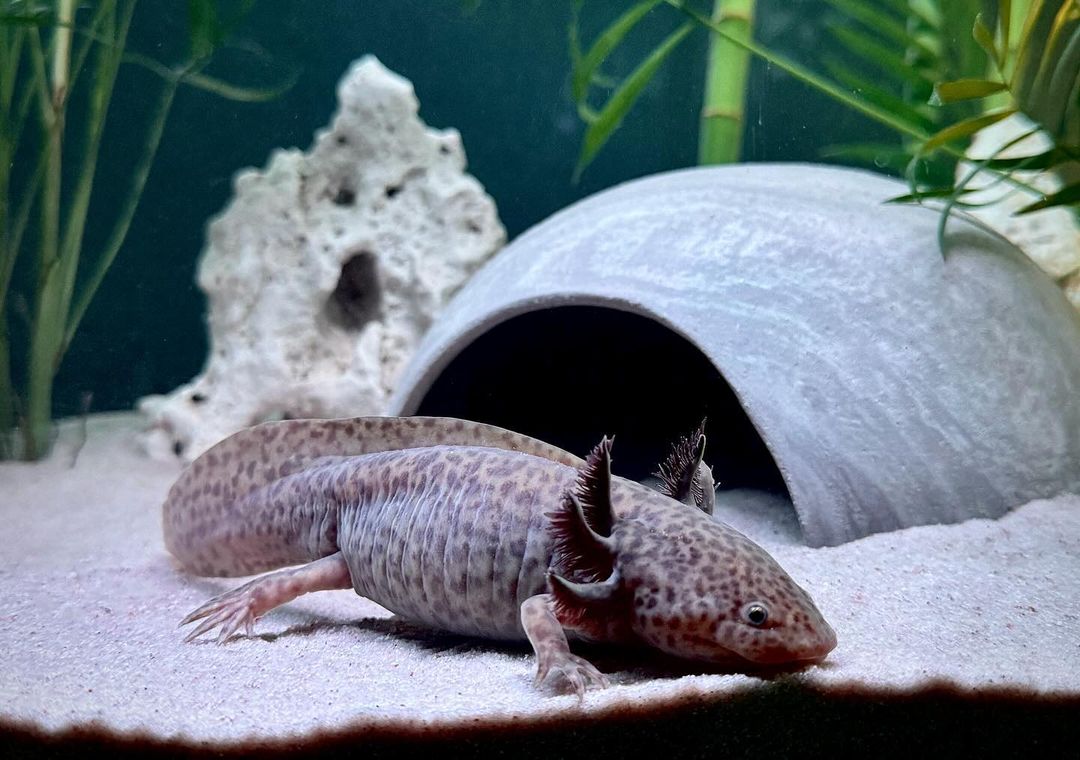
Stress is another reason that can cause your axolotl to fast. The reasons for stress can be many, but the symptoms are usually an axolotl that refuses to eat or that eats but will quickly vomit and regurgitate its food.
It will also spend a lot of time hiding in its shelter or in a corner of the tank, or maybe the opposite, it will swim wildly and wander around the tank but in a random and fast way.
The bad quality of the water can also stress your axolotl or even its tank mate or fish that you have introduced in the tank and that attack its gills…etc
14-Bloated Axolotl will stop feeding :
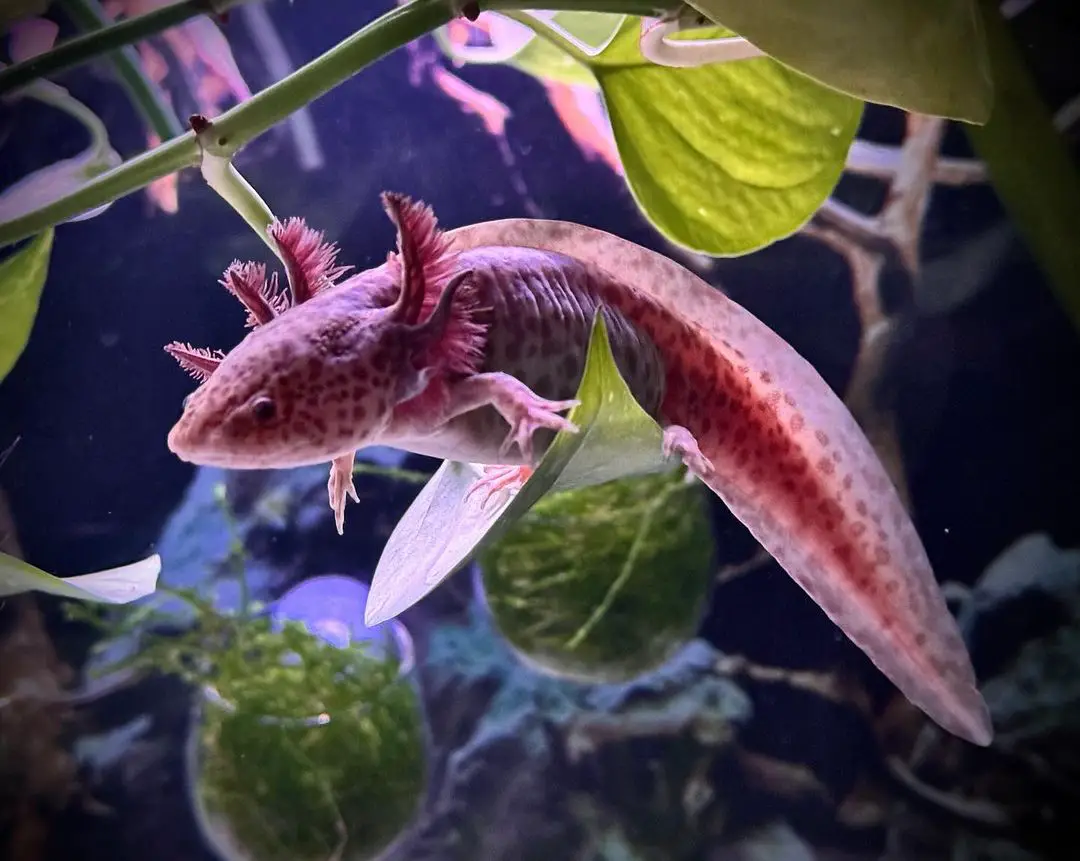
The other reason why your axolotl won’t touch his food even his favorite treats is if he has a swollen belly, which will compress his digestive tract and make it very difficult for him to digest and feed himself, and will end up preferring not to eat because of the discomfort!
Egg or Water retention can be the cause and it is usually due to a dysfunction of the time of your axolotl. Only a veterinarian can confirm this diagnosis and it is useless to panic.
If on the other hand, your axolotl is an adult female, and she has a swollen belly or abdomen, it is probably due to the eggs!
See if you can find a male axolotl to put in the tank, add some plants on which she will deposit her eggs after she is fertilized by the male, this will free her belly and she will quickly start to feed again
The deposit of the eggs can last up to three days.
15- A sick or injured axolotl will reject its food
If your axolotl is sick, the first thing it will do is stop feeding. All axolotl illnesses are likely to encourage it to fast.
Wounds are also one of the reasons why your axolotl will not eat, it may have been bitten in the mouth by a mealworm or just suffered abrasions from the shell of a shrimp or a pellet that was a bit too hard.
So remember to check that your axolotl does not show any symptoms of disease or injury in the mouth or on the body and even its gills.
16- Your axolotl wants live food instead of pellets
When an axolotl is not willing to eat, they sometimes want to satisfy their hunting instinct and will go into hunting mode.
Your axolotl will ignore any kind of food that does not show signs of life. You can try to introduce some guppies or minnows and river shrimp in his tank, after quarantining them of course.
Your axolotl will probably get his appetite back as you will trigger his hunting instinct and he will start to hunt his new tank mates and start feeding again.
17- Axolotls may ignore their food because of water or eggs retention
Egg or water retention in axolotls, although infrequent, can manifest under certain circumstances.
This condition, characterized by noticeable bloating, can impede normal eating patterns by exerting pressure on the animal’s digestive system. Should your axolotl display signs of bloating and after ruling out other potential causes, consider immersing them in a 40% concentration of either Holtfreter’s or John’s solution.
For female axolotls, facilitating egg-laying behavior by introducing a male companion, along with providing suitable plants or decoration for egg deposition, may prove beneficial. Urgent veterinary attention is advised if:
- No improvement is observed within 48 hours.
- Additional symptoms emerge.
- Female axolotls encounter difficulties in egg-laying, or if the viability of eggs appears compromised.
Holtfreter’s Solution
- 4 teaspoons Calcium chloride1.5 cups Non-iodized table salt
- 1.5 teaspoons Potassium Chloride
- 3 tablespoons Epsom salt
Preparation:
Mixed in a 2.5-gallon of dechlorinated tap water
Usage: Add 1/2 cup of this solution to 5 gallons of dechlorinated water
Final Thoughts
Finally, I hope I have covered all the possible reasons why your axolotl may refuse food and in some cases regurgitate it.
If you know of other reasons, please share them with other axolotl lovers by shooting me a mail.
Frequently Asked Questions
How long can axolotls go without eating?
An axolotl that has just been introduced into a new tank may go without food for 3 days, or more if it has just had a hearty meal in the pet store.
Adult axolotls can go up to 2 weeks, sometimes even 3 weeks without eating, especially if they have had a good feast at their last meal.
Why is my axolotl so skinny?
Your axolotl is so skinny because it is either sick and does not eat anymore, you do not give it enough food or you put too much time between meals.
Diseases or parasites in the digestive system or on the skin can also cause anorexia in axolotls.
A low fat/protein diet can also be the cause, so consider giving your axolotl more nightcrawlers and good quality pellets like Hikari for example.
Why is my axolotl spitting out its food?
Axolotls suck out food and then think about it, so if the food tastes bad, is too hard, or is too big to swallow, your axolotl will quickly regurgitate it.
It also happens to axolotls to spit out their food if the water temperature drops very quickly.
My Axolotl hasn’t eaten in a month!
An adult axolotl can’t technically go without food for more than 3 weeks if there isn’t a valid reason for it. If none of the solutions proposed in this article seem to solve your problem, I strongly recommend you ask a Vet for advice and to bring a sample of stools for analysis
Can you force an axolotl to eat?
You should know that force-feeding an axolotl is not opening its mouth and stuffing it with pellets! You can just wet some pellets with water from the tank, grab your axolotl with a clean soft cloth and try to feed it with a syringe but without forcing it too much if it continues to regurgitate this mixture.
Force-feeding is not recommended and it is best to find out why your axolotl refuses to feed and act accordingly.
But you can try to encourage your axolotl to eat by exciting him a bit more to trigger his predatory instinct.
Some axolotls like live food more than dead prey or pellets, so you can bring the worm or piece of meat to life by waving it in front of its eyes.
Can you overfeed an axolotl?
It is not advisable to feed an axolotl more than it normally eats or to shorten the time between meals. Baby axolotls eat twice a day, young axolotls once a day, sub-adult ones only eat once every two days while adult axolotls may be fed once every three days, or even a week or more for some individuals who eat a lot in one meal.
Baby axolotl not eating
Baby axolotls start hunting just two or three days after hatching. If they refuse to eat, it is probably due to the poor quality of the water or its temperature, too high or too low, if not, it will be necessary to look at the food itself because axolotls that have not yet grown beyond one inch (two or three centimeters) eat only live food, including Microworms, baby brine shrimp (BBS) and daphnia.
Some useful Resources
Sensitivity of Axolotl Feeding Behaviors – Oxford Academic
https://academic.oup.com/icb/article/61/5/1881/6297219
ResearchGate
New findings in the searching of an optimal diet



Well, that information is completely useless because in your world and words all axolotls are male. My granddaughter has a female axolotl -Maddie. She has been fit and healthy for nearly one year (birthday present from parents). Australia so not a cold place. Max was bought as a companion maybe 2 months ago. All good with both getting bigger. Then Maddie stopped eating about 2 weeks ago. She was plump and active, as active as an axolotl can be. Nothing has changed. Summer in Australia so warm. Maddie is now super thin two weeks later. Seems interested in what is happened but won’t eat even if we leave it there in front of her mouth. Now separated Maddie and Max into two tanks in different rooms in case stress. Still Maddy won’t eat. Looks so close to death. Distressed 7 year old. What can it be?
First of all, thank you for your comment, and know that I understand very well how stressful it is when our pets are not doing well and we can’t find an answer anywhere!
In my article, I give you the points to check when your male or female axolotl stops feeding and it’s up to you to look at each case according to the climate in which your axolotls live, the water temperature seems to be the point on which you have to start! it can be a little too hot for the axolotls and don’t forget the sudden temperature change between the night and the day, which the axolotls don’t like too!
You should consider installing a “Chiller” during the hot season.
I need a lot of parameters to give you an accurate idea of what is happening but I recommend you to check each point mentioned in the article and also ask the opinion of a veterinarian, it may be a parasitic infection if not the stress caused by their micro-climate!
Thanks again.